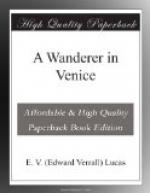The steps of the Redentore are noble, but within it is vast and cold and inhuman, and the statues in its niches are painted on the flat. Tintoretto’s “Descent from the Cross” in the church proper is very vivid. In the sacristy, however, the chilled visitor will be restored to life by a truly delightful Madonna and Child, with two little celestial musicians playing a lullaby, said to be by Bellini, but more probably by Alvise Vivarini, and two companion pictures of much charm. Like the Salute, the Redentore was a votive offering to heaven for stopping a plague. Every year, on the third Sunday in July, a bridge of boats crosses the Grand Canal at the Campo S. Zobenigo, and then from the Zattere it crosses the Giudecca canal to this church. That day and night the island is en fete. Originally these bridges were constructed in order that the Doges might attend a solemn service; but to-day the occasion is chiefly one of high spirits. In the gallery of the Palazzo Pesaro is a painting representing the event at a recent date; in the Querini Stampalia gallery a more ancient procession may be seen.
There, too, are many views of regattas which of old were held on the Grand Canal but now belong to the canal of the Giudecca. The Venetians, who love these races, assemble in great numbers, both on the water, in every variety of craft, and on the quay. The winning-post is off the end of the island of S. Giorgio; the races start from varying points towards the harbour. In April I saw races for six oars, four oars, two oars, and men-of-war’s boats. The ordinary rowers were dull, but the powerful bending gondoliers urging their frail craft along with tremendous strokes in unison were a magnificent spectacle. The excitement was intense towards the end, but there was no close finish. Between the races the exchange of chaff among the spectators was continuous.
The question of where to live in Venice must, I think, be a difficult one to solve. I mean by live, to make one’s home, as so many English and Americans have done. At the first blush, of course, one would say on the Grand Canal; but there are objections to this. It is noisy with steamboat whistles and motor horns, and will become noisier every day and night, as the motor gains increasing popularity. On the other hand, one must not forget that so fine a Venetian taster as Mr. Howells has written, “for myself I must count as half lost the year spent in Venice before I took a house upon the Grand Canal.”
Personally, I think, I should seek my home elsewhere. There is a house on this Giudecca—a little way along from the S. Giorgio end—which should make a charming abode; for it has good windows over the water, immediately facing, first, the little forest of masts by the Custom House, and then the Molo and the Ducal Palace, and upon it in the evening would fall the sinking sun, while behind it is a pleasant garden. The drawbacks are the blasts of the big steamers entering and leaving the harbour, the contiguity of some rather noisy works, and the infrequency of steamboats to the mainland.




